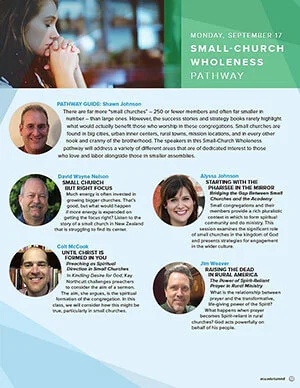Small Churches and Abilene Christian University Summit
I first attended Abilene Christian University Lectureship when I was a freshman Bible major in February 1986. This was back in the days when they still put up the big tent on the other side of Edwards Dormitory, my home for two years. The tent was a place for seeing the booths of different missionaries, singing schools, stores selling Bibles and other books, and many other things that might interest those attending Lectureship. At varying times during the day all the participants would go to their selected classes to hear the subjects that appealed to them. Then at the main times during the day they would all gather in Moody Coliseum to listen to some well-known speaker. And if you had to miss a keynote lecture or just wanted to have those words preserved for you, you would find the bookstore (or booth) and buy the annual Lectureship book.
Lectureship at Abilene Christian University has been going on now for over 100 years and many books of these lectures were published. I have been blessed to inherit my grandfather’s library, including many Lectureship books, with the oldest one being a combined volume from 1922 and 1923. The books ceased publication with the 1990 volume. These annual gatherings moved from February to September in 2006. The tent is no longer put up each year as the booths are scattered throughout the Bible building and McGlothlin Campus Center. Today you can even “attend” Lectureship, now called Summit, by simply downloading an app, although many people still make the annual trek to Abilene.
Summit has expanded in a number of different directions, bringing attention to a number of things facing Christians and churches, intentionally appealing to those with specialized interests, and inviting some prominent names within Christianity to present powerful and memorable lessons. Since my freshman year I have attended this annual event every single year. But as I labored in churches of around 100 members, my observation was that it was getting much more difficult for me to find a class or listen to a speaker who would say something that would directly help me with the congregation I served. That doesn’t mean I didn’t hear fascinating and inspiring lessons. It just means I couldn’t take what I had just learned and use it back home, either from the pulpit or in my ministry context. [1]
Talking with several of my fellow preachers from similarly sized congregations, I discovered that I was not alone in this assessment. But unlike my perfect attendance throughout the years, many of these fellow preachers decided they would simply stop attending this annual event in Abilene. I kept coming, kept enjoying it, but still couldn’t find things that directly spoke to my ministry context of a small church.
A few years ago, I was blessed with the opportunity to visit with Dr. David Wray, the current director of Summit. I was able to talk about this missing dimension with a vision to do something during Summit that would appeal to people like me who work with small churches. David was gracious in opening a door for a track of several classes all related to small churches. David doesn’t have a background in working with small churches, so he empowered me to take leadership with this program. This was all still about a year before the Summit 2017 was to begin.
But that was enough time to invite the right speakers, [2] do a little bit of advertising, pray, and prepare for a time when something at Summit was designed specifically for the many people who had unintentionally become disenfranchised by this annual gathering. When September rolled around, and it was time for these special lectures, I feared no one would attend. And then at 8:30 a.m. when the first class began I was thrilled to see that the classroom set aside for us was over 90% full. And those who attended stuck around for the full day of classes.
Those who participated were gracious and kind, offering positive feedback about these classes. They engaged in conversations that united these people who understood what it was like to labor in a small church. One person said that the only reason he attended Summit that year was because of the inclusion of the small church track. And before Summit 2017 concluded, it was already determined that this track would be included again in Summit 2018. It is my prayer that this small church track remain a part of Summit for years to come.
On Monday, September 17, 2018, there will be a Small Church Wholeness Pathway at ACU Summit. Each of the speakers will have something unique to say, but all related to efforts within small churches. The speakers this year will be David Nelson (a missionary in New Zealand), Colt McCook (transitioning from ministry in Winters, Texas, to the Searcy, Arkansas area), Alyssa Johnson (working on her Ph.D. in English at Texas Christian University), and Jim Weaver (director of Rural America Ministries).
Please come to the 2018 Abilene Christian University Summit. If you work with a small church, you will find something specifically for you.
[1] What may be considered relevant and cutting-edge ministry in larger congregations would often get a preacher in a small church fired. This fired preacher would then face great difficulty in being hired in many other small churches and not be a good fit in a larger church.
[2] The speakers at the 2017 Summit small church track included Dr. Tim Sensing (Mosaic article, Summit session), Dr. Michael Harbour, Dr. Wes Horn (Mosaic article), Trent Tanaro (Mosaic article, Summit session), and me (Mosaic articles, Summit session). A number of audio recordings from past Summit sessions are available here.








